Discover Code Switch
Code Switch

Code Switch
Author: NPR
Subscribed: 90,418Played: 2,456,746Subscribe
Share
© Copyright 2015-2025 NPR - For Personal Use Only
Description
What's CODE SWITCH? It's the fearless conversations about race that you've been waiting for. Hosted by journalists of color, our podcast tackles the subject of race with empathy and humor. We explore how race affects every part of society — from politics and pop culture to history, food and everything in between. This podcast makes all of us part of the conversation — because we're all part of the story. Code Switch was named Apple Podcasts' first-ever Show of the Year in 2020.
Want to level up your Code Switch game? Try Code Switch Plus. Your subscription supports the show and unlocks a sponsor-free feed. Learn more at plus.npr.org/codeswitch
Want to level up your Code Switch game? Try Code Switch Plus. Your subscription supports the show and unlocks a sponsor-free feed. Learn more at plus.npr.org/codeswitch
591 Episodes
Reverse
The late Reverend Jesse Jackson was — and still is — a revered civil rights activist, political trailblazer, and pop culture icon. For his critics, he was also villainized, or at the very least, a punchline. As Jackson's home going ceremony continues, we take some time to remember how Jackson shaped American politics with journalist Adam Serwer, who warns us not to flatten Jackson into a cliche or caricature.To manage podcast ad preferences, review the links below:See pcm.adswizz.com for information about our collection and use of personal data for sponsorship and to manage your podcast sponsorship preferences.Learn more about sponsor message choices: podcastchoices.com/adchoicesNPR Privacy Policy
While Puerto Rican independence is in the spotlight after Bad Bunny's Super Bowl halftime show, we're throwing it to our play cousins at La Brega, a show about all things Puerto Rico. We hear from former Young Lords member Iris Morales about how the group took their love for their homeland to educate and organize against U.S. colonialism.To manage podcast ad preferences, review the links below:See pcm.adswizz.com for information about our collection and use of personal data for sponsorship and to manage your podcast sponsorship preferences.Learn more about sponsor message choices: podcastchoices.com/adchoicesNPR Privacy Policy
Jeremy Carl — President Trump's nominee for a senior State Department role -- was called out for his commentary on "white erasure" during his Senate confirmation hearing earlier this month. He defended the idea that "white culture" is in danger of being erased in the U.S. and that white people face more racial discrimination than any other group in country. So on this episode, we're talking to the Princeton historian Nell Irvin Painter about her book, The History of White People, and how definitions of whiteness have morphed over time depending on the interests of the people creating those definitions.To manage podcast ad preferences, review the links below:See pcm.adswizz.com for information about our collection and use of personal data for sponsorship and to manage your podcast sponsorship preferences.Learn more about sponsor message choices: podcastchoices.com/adchoicesNPR Privacy Policy
The U.S. has been deporting people from Cuba in record numbers. That has come as a shock to many Cuban American communities, who had long enjoyed special protections that don't apply to most other immigrant groups. This week on the show we're talking about where this change fits into the trajectory of Cuban immigration to the U.S. We'll hear from Ada Ferrer, a historian at Princeton who shares how her family's divergent paths to the U.S. reverberated through her life. Then, we talk to historian Michael Bustamante of the University of Miami about how U.S.-Cuba immigration policy has evolved since the Cuban Revolution.To manage podcast ad preferences, review the links below:See pcm.adswizz.com for information about our collection and use of personal data for sponsorship and to manage your podcast sponsorship preferences.Learn more about sponsor message choices: podcastchoices.com/adchoicesNPR Privacy Policy
When President Trump shared a racist video on his Truth Social account last week, the blowback was real. But the video is also part of a tradition that has existed in the U.S. since the early 1800s — of using "humor" to spread and crystallize racist ideals. On this episode, we speak with Raul Perez, the author of "The Souls of White Jokes: How Racist Humor Fuels White Supremacy," who tells us how making fun of Black people was crucial to constructing "whiteness" — and perpetuating white supremacy — in the early days of the U.S.To manage podcast ad preferences, review the links below:See pcm.adswizz.com for information about our collection and use of personal data for sponsorship and to manage your podcast sponsorship preferences.Learn more about sponsor message choices: podcastchoices.com/adchoicesNPR Privacy Policy
Dating can be tough. Dating while Black? That can feel nigh impossible sometimes, given how the long tentacles of racism have wrapped themselves around every aspect of our lives (and hearts.) But was dating any easier in the past? We're putting that question to the test on this special Valentine's Day episode of the pod. We revisit a conversation with audio storyteller and host of the podcast, Our Ancestors Were Messy, Nichole Hill. She takes us back in time to 1937, using archival personal ads from the Washington Afro-American to show us what it was like for Black folks to date almost a century ago.To manage podcast ad preferences, review the links below:See pcm.adswizz.com for information about our collection and use of personal data for sponsorship and to manage your podcast sponsorship preferences.Learn more about sponsor message choices: podcastchoices.com/adchoicesNPR Privacy Policy
Can a superstar be an actual voice of resistance? How does Bad Bunny's choice to perform at the NFL Super Bowl halftime show square with his politics of resistance to U.S. imperialism and decision to avoid the U.S. in his current world tour? We're speaking with Bad Bunny experts and authors of "P FKN R: How Bad Bunny Became the Global Voice of Puerto Rican Resistance," Vanessa Diaz and Petra Rivera-Rideau.To manage podcast ad preferences, review the links below:See pcm.adswizz.com for information about our collection and use of personal data for sponsorship and to manage your podcast sponsorship preferences.Learn more about sponsor message choices: podcastchoices.com/adchoicesNPR Privacy Policy
In so many spaces, celebrating Black History History month means learning a few fun facts about famous African Americans. But Black History Month was designed to be much more radical — it was an opportunity for Black communities to learn about the aspects of their history that had been downplayed, diminished, or even actively suppressed. We talk to historian Jarvis Givens about his new book, “I’ll Make Me A World: The 100-Year Journey of Black History Month”, and how studying and preserving Black history has changed (or not) over the years.To manage podcast ad preferences, review the links below:See pcm.adswizz.com for information about our collection and use of personal data for sponsorship and to manage your podcast sponsorship preferences.Learn more about sponsor message choices: podcastchoices.com/adchoicesNPR Privacy Policy
"Fighting crime" is often used as a justification for many of the Trump administration's policies — from mass deportations to its actions in Venezuela to its crackdown in Minnesota — despite the fact that crime is at a historic low, and has been falling for decades. We talk to Meg Anderson, NPR’s criminal justice correspondent, about how that taps into Americans' disproportionate fears about crime, and how that makes scenes like what we see in Minneapolis possible.To manage podcast ad preferences, review the links below:See pcm.adswizz.com for information about our collection and use of personal data for sponsorship and to manage your podcast sponsorship preferences.Learn more about sponsor message choices: podcastchoices.com/adchoicesNPR Privacy Policy
To the casual observer, it might seem like the U.S. has spent years in a constant state of protest — and they’re only getting more intense under the second Trump administration. So we’re revisiting our conversation with Gloria J. Browne-Marshall, the author of “A Protest History of the United States” about what forms of protest have worked in the past, and what lessons people can take from those protesters.To manage podcast ad preferences, review the links below:See pcm.adswizz.com for information about our collection and use of personal data for sponsorship and to manage your podcast sponsorship preferences.Learn more about sponsor message choices: podcastchoices.com/adchoicesNPR Privacy Policy
What does the humble, boring quarter-zip sweater have to do with respectability politics and Blackness? Apparently, a lot! When two young Black men on TikTok brought the quarter-zip into vogue for young folks, they unknowingly waded into some very long-lived discourse on Black fashion and looking "respectable." Today on the pod, we chop it up with Jonathan Square, professor of Black visual culture at Parsons School of Design, about Black fashion, and what's happening more broadly to make this pretty plain sweater the "it" garment.To manage podcast ad preferences, review the links below:See pcm.adswizz.com for information about our collection and use of personal data for sponsorship and to manage your podcast sponsorship preferences.Learn more about sponsor message choices: podcastchoices.com/adchoicesNPR Privacy Policy
Sanctuary policies have been described on both sides of the aisle as protecting immigrants. But in many ways, in practice, they have given rise to a specific kind of policing that gives ICE a much wider reach than it might otherwise have. We talk to anthropologist Peter Mancina, who is the author of a recent book, On the Side of Ice: Policing Immigrants in a Sanctuary State about his on-the-ground research embedding with police in New Jersey.To manage podcast ad preferences, review the links below:See pcm.adswizz.com for information about our collection and use of personal data for sponsorship and to manage your podcast sponsorship preferences.Learn more about sponsor message choices: podcastchoices.com/adchoicesNPR Privacy Policy
In honor of MLK Day, we sit down with historian Nicholas Buccola, author of One Man’s Freedom, to re-examine the concept of "freedom" by comparing the legacies of Reverend Martin Luther King Jr. and conservative politician Barry Goldwater. In our conversation, Buccola reveals the profound gulf between Goldwater's abstract view of freedom and King's focus on the daily fight for dignity and individual liberty– and he helps us understand what this historical battle can teach us about the fight for freedom today.To manage podcast ad preferences, review the links below:See pcm.adswizz.com for information about our collection and use of personal data for sponsorship and to manage your podcast sponsorship preferences.Learn more about sponsor message choices: podcastchoices.com/adchoicesNPR Privacy Policy
The U.S. ousting of Venezuelan President Nicolás Maduro is just the latest chapter in a long, troubling history of American intervention in Latin America. NPR immigration correspondent Jasmine Garsd brings us to the New York courthouse where President Maduro was indicted by the U.S. government. We also talk to Pulitzer Prize-winning historian Greg Grandin, who explains how the modern concept of national sovereignty — a country’s right to govern itself — originated in Latin America as a response to U.S. expansion.To manage podcast ad preferences, review the links below:See pcm.adswizz.com for information about our collection and use of personal data for sponsorship and to manage your podcast sponsorship preferences.Learn more about sponsor message choices: podcastchoices.com/adchoicesNPR Privacy Policy
2026 is off to an intense start, but many of the events we're seeing play out today come out of dynamics that have been building for years. Jelani Cobb, a journalist, historian, and the Dean of Columbia's journalism school, talks to us about his new book, Three of More is a Riot (Notes on How We Got Here: 2012-2025), which analyzes some of the major events of the United States' past decade and a half, and how they've set the groundwork for much of what's happening now.To manage podcast ad preferences, review the links below:See pcm.adswizz.com for information about our collection and use of personal data for sponsorship and to manage your podcast sponsorship preferences.Learn more about sponsor message choices: podcastchoices.com/adchoicesNPR Privacy Policy
Connecting across generations can be tough, even in the same family. This is at the heart of Amy Tan’s 1989 novel The Joy Luck Club. This week, we're bringing you an episode from NPR's Books We Loved series, where our very own B. A. Parker, along with Andrew Limbong and The Indicator’s Wailin Wong, discuss how miscommunication and misunderstandings between parents and their children continues to be a theme in stories of immigrant families today.You can listen to more Books We Loved in the Book of the Day podcast feed.To manage podcast ad preferences, review the links below:See pcm.adswizz.com for information about our collection and use of personal data for sponsorship and to manage your podcast sponsorship preferences.Learn more about sponsor message choices: podcastchoices.com/adchoicesNPR Privacy Policy
Among the American public, support for Israel has fallen among almost every demographic group. But for many White Evangelical Christians over the age of 35, support has remained steadfast. And that support continues to be a major shaper of U.S. policy in the region. So today, in our final installment of the Code Switch History Class series, we're looking into the history and theology behind how White Evangelicals became so connected to Israel, and what that connection looks like in the public square.To manage podcast ad preferences, review the links below:See pcm.adswizz.com for information about our collection and use of personal data for sponsorship and to manage your podcast sponsorship preferences.Learn more about sponsor message choices: podcastchoices.com/adchoicesNPR Privacy Policy
A few years back, many politicians were raising the alarm about the dangers of "CRT" in schools. Today, the new risk to public education is "DEI." What do both of these moments have in common? They have all the elements of a moral panic. So in this installment of Code Switch History Class, we're looking at the history of moral panics in the U.S., and why they so often invoke fears about race and integration.To manage podcast ad preferences, review the links below:See pcm.adswizz.com for information about our collection and use of personal data for sponsorship and to manage your podcast sponsorship preferences.Learn more about sponsor message choices: podcastchoices.com/adchoicesNPR Privacy Policy
In 2018, in light of some pretty aggressive rhetoric and policies being enacted by the Trump administration, many people were asking a pretty direct question: Should ICE be abolished? Seven years later, amidst arguably even harsher policies and language, many are still asking that same question. So today, on the second installment in our Code Switch History Class series, we're taking a look at where ICE came from, and talking to an expert about what a more humane immigration system might necessitate.To manage podcast ad preferences, review the links below:See pcm.adswizz.com for information about our collection and use of personal data for sponsorship and to manage your podcast sponsorship preferences.Learn more about sponsor message choices: podcastchoices.com/adchoicesNPR Privacy Policy
The fight over the soul of higher education is very alive right now, with the Trump administration engaged in dozens of investigations and multiple lawsuits against colleges and universities around the country. Billions of research dollars at those schools have been frozen, too. So today, in a special series called Code Switch History Class, we're looking back at another time of upheaval — a long, bloody strike at San Francisco State that forever changed higher education in the United States.To manage podcast ad preferences, review the links below:See pcm.adswizz.com for information about our collection and use of personal data for sponsorship and to manage your podcast sponsorship preferences.Learn more about sponsor message choices: podcastchoices.com/adchoicesNPR Privacy Policy
















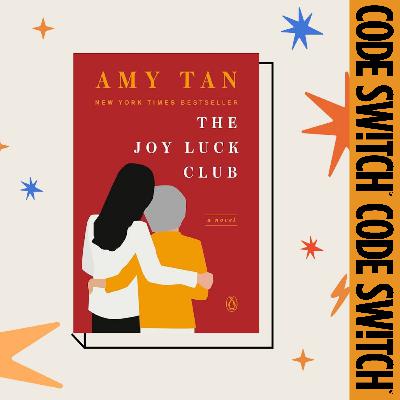
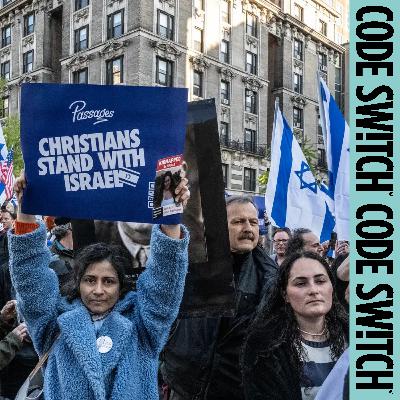
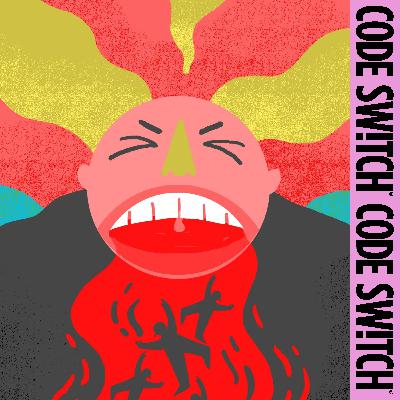
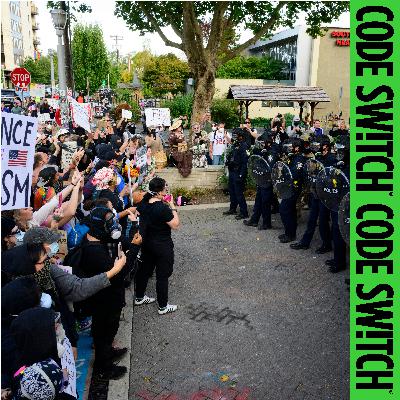
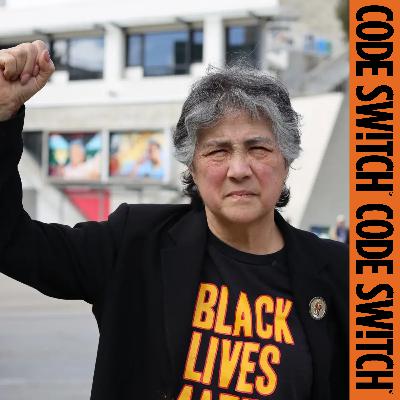



thanks again!
Great episode..Thanks
There is so much good content in this episode, but I can hear the wetness of the host's mouth. I'm not sure if she needs different mic settings or the audio needs to be filtered somehow.
Correction *Persian Gulf
With each episode I listen to from NPR, I agree more and more with Trump cutting their funds. They are shameless mouths of the Empire. Unsubscribed this podcast too, with joy ✅
Such a beautiful episode.
The unspoken theme of the Trump administration is that black people don't have anything in this country that they earned. The spoken theme of this country is that they will do anything possible to to postpone the Hispanics becoming a majority
🌮
I remember this! I remember the news coverage and thinking what in the world happened to make the city d*mn near burn up the block like this? I remember listening to a previously local newscaster that had moved (to or nearby the Philly area?) who was visiting at her old news station when this happened. She spoke with such venom/disdain in her voice that it felt like it was personal for her and seemed unprofessional.
This was very informative for a foreign national with a visa and planned (maybe soon to cancel) travel.
great...
I mean, he basically laid out the case for WHY owners don't care: people who are already filthy rich dangling in front of you the opportunity of a lifetime, one in which, even in his three short years, presents the kind of wealth the average spectator can't fathom. As he said from the get-go, American football is America (the US) at its finest because it's US Capitalism at its finest--only here even the downtrodden will mostly walk away with a small fortune for a glorified workout.
Hurt My heart such innocence.. but definitely a real conversation to be had
thanks!
The interviewer seems really naive. Who doesn't know by now that the only thing the producers care about is what they think will make a good TV show? They don't give a damn about true love or lasting relationships. They just want something that people will watch.
Terrific episode.
I'm researching this!
check out The End of Tourism podcast:)
This episode really touched my heart, in particular at the end. Parker connected with the author, showing that humanity is very real. More of this. Please.
This episode really touched my heart, in particular at the end. Parker connected with the author, showing that humanity is very real. More of this. Please.